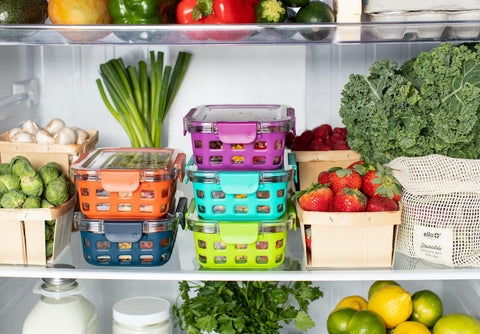Fruits and vegetables are a crucial part of a healthy diet, providing essential nutrients for our bodies. To get the most out of your produce, you need to store them correctly. Proper storage can significantly extend the shelf life of fruits and vegetables, maintain their nutritional value, and prevent food waste. In this article, we will discuss the importance of storing fruits and vegetables and provide general guidelines for storage, as well as specific tips on how to store common fruits.
Understanding the Importance of Proper Storage
Proper storage of fruits and vegetables is an essential part of maintaining a healthy and sustainable diet. Not only does it help to preserve the freshness, nutritional value, and flavor of produce, but it also reduces the amount of food waste that ends up in landfills. By taking the time to learn about the different storage requirements for different types of fruits and vegetables, you can ensure that you get the most out of your produce while minimizing waste.
Extending Shelf Life
One of the main benefits of proper storage is that it can significantly extend the shelf life of fruits and vegetables. For example, storing apples and pears in a cool, dry place such as a pantry or cellar can help to slow down the ripening process and prevent them from becoming overripe too quickly. Similarly, storing root vegetables like carrots and potatoes in a dark, cool place can help to prevent them from sprouting or going soft.
On the other hand, some fruits and vegetables should be stored in the refrigerator to help slow down bacterial growth and prevent mold. Berries, for example, are highly perishable and should be stored in the fridge as soon as possible after purchase. Leafy greens like spinach and lettuce can also benefit from refrigeration, as it helps to slow down the wilting process and keep them crisp for longer.
Maintaining Nutritional Value
In addition to extending shelf life, proper storage can also help to maintain the nutritional value of fruits and vegetables. Some produce, such as tomatoes and avocados, can continue to ripen and develop flavour even after they've been harvested. Storing these types of produce at room temperature can help to preserve their taste and texture, while refrigeration can cause them to lose some of their flavours.
Other types of produce, such as leafy greens and broccoli, can lose their nutrients quickly if stored at room temperature. To preserve their nutritional value, it's best to store these types of produce in the refrigerator as soon as possible after purchase. Similarly, citrus fruits and peppers can retain their nutrients for longer when stored in a cool, dry place.
Preventing Food Waste
By storing fruits and vegetables correctly, you can help to reduce the amount of food waste that you produce. When produce is stored improperly, it can spoil quickly and become unusable, leading to unnecessary waste. By taking the time to learn about the storage requirements for different types of produce, you can ensure that you use up what you buy and minimise waste.
Proper storage can also help to reduce the need for frequent trips to the store. When produce stays fresh for longer, you can buy in bulk and reduce the number of times you need to go shopping. This not only saves time and money but also helps to reduce your carbon footprint by reducing the amount of transportation required to get food to your table.
Overall, proper storage is an essential part of maintaining a healthy and sustainable diet. By taking the time to learn about the different storage requirements for different types of produce, you can ensure that you get the most out of your food while minimising waste and supporting a more sustainable food system.
General Guidelines for Storing Fruits and Vegetables
While different types of produce require specific storage conditions, some general guidelines apply to most fruits and vegetables. Proper storage can help extend the shelf life of your produce and keep it fresh for longer. Here are some tips:
Temperature and Humidity
Fruits and vegetables have varying temperature and humidity preferences for storage. As a general rule, most fruits and vegetables should be stored in a cool, dry place, away from direct sunlight and heat sources. The ideal temperature range for storing most types of produce is between 0°C and 5°C, while the ideal humidity range is 90-95%. Refrigerators are the best storage option for most fruits and vegetables, as they can maintain a consistent temperature and humidity level.
Some fruits and vegetables, such as tomatoes and bananas, can lose flavour and texture if stored in the refrigerator. These should be stored at room temperature instead, in a location away from direct sunlight and heat sources. On the other hand, some produce, such as potatoes and onions, should be stored in a cool, dark place, but not in the refrigerator.
Separating Certain Produce
Some fruits and vegetables can release gases that can affect the ripening and quality of other produce stored nearby. To prevent this, store ethylene-producing fruits, such as apples, bananas, and avocados, separately from ethylene-sensitive produce, such as leafy greens, broccoli, and grapes. If you don't have enough space to separate your produce, consider using a produce storage bag or container that has separate compartments for different types of produce.
It's also important to wash your produce before storing it, as bacteria and dirt can cause spoilage and mould. However, make sure to dry your produce thoroughly before storing it, as excess moisture can lead to rotting.
Using Storage Containers
Using proper storage containers can help extend the shelf life of fruits and vegetables. For instance, store leafy greens in airtight containers or bags with a damp cloth to maintain their freshness, or store avocados and papayas in paper bags to speed up the ripening process. Plastic bags can also be used to store produce, but make sure to poke a few holes in the bag to allow for air circulation.
When storing produce in the refrigerator, make sure to keep it organised and visible. This will help you avoid forgetting about certain items and letting them go bad. Consider using clear storage containers or labelling your produce with the date you bought it to help you keep track of its freshness.
By following these general guidelines for storing fruits and vegetables, you can help ensure that your produce stays fresh and flavourful for as long as possible.
How to Store Common Fruits
Apples
Apples are a popular fruit that can be enjoyed in many ways. Whether you like them sliced, baked, or as a snack, it's important to store them properly to ensure they stay fresh and delicious. When storing apples, it's best to keep them in the refrigerator, away from other produce. This will help prevent them from ripening too quickly and becoming overripe. If you plan on storing apples for an extended period, consider wrapping each apple in paper to prevent contact with other apples or vegetables, which can cause spoilage.
Did you know that apples are a good source of fibre and vitamin C? Eating an apple a day can help promote good digestion and boost your immune system. So, make sure to store your apples properly to enjoy their many health benefits!
Bananas
Bananas are a versatile fruit that can be used in smoothies, baked goods, or simply eaten on their own. When storing bananas, it's best to keep them at room temperature until they are ripe. Once they are ripe, transfer them to the refrigerator to slow down ripening. It's important to store ripe bananas separated from unripe ones, as ripening fruit releases ethylene gas which can speed up the ripening of nearby produce.
Did you know that bananas are a good source of potassium and vitamin C? Eating bananas can help regulate blood pressure and support heart health. So, make sure to store your bananas properly to enjoy their many health benefits!
Berries
Berries are a delicious and nutritious fruit that can be enjoyed in many ways. Whether you like them in a smoothie, on top of yogurt, or as a snack, it's important to store them properly to ensure they stay fresh and flavourful. When storing berries, it's best to keep them in the refrigerator, unwashed and loosely packed in a container. Wash them just before eating to prevent moisture buildup, which can cause mould and spoilage.
Did you know that berries are a good source of antioxidants and fibre? Eating berries can help protect against chronic diseases and support good digestion. So, make sure to store your berries properly to enjoy their many health benefits!
Citrus Fruits
Citrus fruits, such as lemons, limes, oranges, and grapefruits, are a popular fruit that can be used in many recipes or enjoyed on their own. When storing citrus fruits, it's important to consider how ripe they are. Store ripe citrus fruits in the refrigerator to slow down spoilage, while store unripe citrus at room temperature to ripen. Citrus fruits can also be stored in a cool, dark place for up to a week.
Did you know that citrus fruits are a good source of vitamin C and antioxidants? Eating citrus fruits can help boost your immune system and support healthy skin. So, make sure to store your citrus fruits properly to enjoy their many health benefits!
Melons
Whole melons, such as watermelon, rockmelon, and honeydew, are a refreshing and delicious fruit that can be enjoyed in many ways. When storing whole melons, it's best to keep them at room temperature until they are ripe. Once they are ripe, transfer them to the refrigerator to prolong their shelf life. Store cut melons in the refrigerator, wrapped in plastic or in an airtight container, to prevent moisture loss and bacterial growth.
Did you know that melons are a good source of vitamin C and potassium? Eating melons can help hydrate your body and support good heart health. So, make sure to store your melons properly to enjoy their many health benefits!
Stone Fruits
Stone fruits, such as peaches, plums, and nectarines, are a sweet and juicy fruit that can be enjoyed in many ways. When storing stone fruits, it's best to keep them at room temperature until they are ripe. Once they are ripe, transfer them to the refrigerator to slow down spoilage. Store ripe stone fruits in the refrigerator crisper drawer.
Did you know that stone fruits are a good source of fibre and vitamins A and C? Eating stone fruits can help regulate digestion and support healthy skin. So, make sure to store your stone fruits properly to enjoy their many health benefits!
By following these storage tips, you can ensure that your fruits and vegetables stay fresh, nutritious, and delicious for longer. Proper storage not only benefits you by decreasing food waste but also positively impacts the environment by conserving resources and reducing greenhouse gas emissions from landfill sites. So, next time you buy some produce, keep in mind the importance of proper storage and follow our tips to make the most out of your fruits and veggies!




